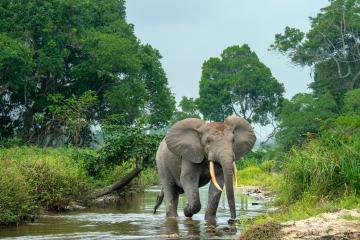
Reducing biodiversity loss to support a healthy ecosystem while guarding against disease spillover events between and among animals and people is a focus of the GEF-funded and UNEP-led Congo Forests Integrated Programme. As information around the illegal wildlife trade is key to law enforcement activities in this area, the Programme is developing a knowledge base to support informed decision-making while also enhancing the capacity of law enforcement personnel and officials across the region to combat the killing of and illegal trafficking in Endangered animals.
There are many drivers threatening biodiversity in the Congo Basin, ranging not only from increasingly large-scale habitat disturbance due to infrastructure development, large scale or artisanal agriculture and mining, but also to climate change, disease and illegal trade. As an example of illegal wildlife trade, in December 2024, a baby gorilla was seized at Istanbul airport. While the flight came from Nigeria, until genotyping is done, we do not know what subspecies the gorilla is and from where it originally comes.
International demand, coupled with poverty and lack of economic opportunities alongside sometimes weak law enforcement, also makes poaching and illegal trafficking to be seen as a viable way to earn income. This poses a serious threat to the survival of African Endangered wildlife.
Many of the illegally traded species play important ecological roles in Africa’s forests, not only as seed dispersers and pollinators, but also in carbon sequestration. For example, African Forest Elephants (shown in the photo) thin out trees, enabling those left to grow larger, resulting in more carbon sequestration in their habitats. Thus, wherever forest elephants roam, they promote the growth of larger, taller trees that in turn contribute to increased natural carbon capture.
Losing biodiversity and intact habitats also facilitates the emergence of new diseases and the spread to other species (spillover events) including humans. A joint UNEP-ILRI study noted that wildlife is the most common source of emerging human disease; between 2012 and 2022 the UN also reports that Africa saw a 63% increase in diseases spread from animals to people.
Reducing biodiversity loss to support a healthy ecosystem while guarding against these spillover events is thus a focus of the GEF-funded and UNEP-led Congo Basin Landscapes Initiative. As information around the illegal wildlife trade is key to law enforcement activities in this area, the Programme is developing a knowledge base to support officials, while developing training for ecoguards and officials, that together help combat illegal trafficking in Endangered animals. For example, the UN Office on Drugs and Crime (UNODC) has completed a regional study of illegal trade in ivory, great apes, African grey parrots and pangolins in the Congo Basin. As this study is undergoing final review before being available publicly, we highlight some of the key findings as follows:
- More than 86,000 African grey parrots were illegally exported from Central Africa between 2016 and 2022 with the main collecting areas notably in the north and west DRC; in Odzala-Kokoua and Nouabale-Ndoki National Parks and Monte Alén National Park in Equatorial Guinea.
- Capture and exports of live great ape infants has increased in recent years for use as pets and commercial zoo exploitation.
- According to DNA testing, the TRIDOM area (border of Cameroon, Congo, and Gabon) has long been one of two key sources of ivory seizures (the other is Eastern Africa). In recent years, some of this ivory was exported through Nigeria.
- While the sourcing of pangolins is mainly organized by local people responding to market demand, the smuggling of scales internationally involves experienced traffickers.
The study will help guide and inform the development of the Economic Community of Central African States (ECCAS) action plan and eco-security policy and strategy to address the drivers of biodiversity loss due to wildlife poaching and trafficking.
Alongside other studies being carried out within the Congo Forests Integrated Programme to guide policy and inform ant-trafficking actions, UNEP, CITES-MIKE and UNODC are working hand-in-hand to also enhance, through series of region and in-country trainings, the capacities and skills of experts of the law enforcement networks in Monitoring the Illegal Killing of Elephants (MIKE), with strong focus on gathering evidence at a wildlife crime scene and on monitoring elephant mortality in the region.
More than 100 rangers have been trained on crime scene management and informant network management in Gabon, DRC, Equatorial Guinea, Congo. The Programme has also facilitated training for rangers from 15 MIKE sites in the subregion on elephant mortality data collection, significantly improving the quality of data submitted around elephant deaths. More than 150 rangers and managers have been trained. While the Proportion of Illegally Killed Elephants (PIKE) estimates for Central Africa remains high, over time, the expectation is that these efforts will help accelerate the current downward trends in PIKE analysis.
Our Programme is looking into holistic solutions to support and improve economic livelihoods, combat climate change, habitat loss and biodiversity loss. People in the Congo Basin need economic opportunities which are not threatening biodiversity, and conservation must represent a viable economic opportunity. This knowledge, gathered by UNODC, together with the training CITES MIKE is providing, are just two examples of how the Programme is supporting governments and communities in finding sustainable pathways to development.
About the Programme
The UNEP-led multi-partner and multi-country Congo Basin Landscapes Initiative, through the GEF-funded Congo Forest Integrated Programme, is working with governments and partners on different fronts to catalyse transformational change in the conservation and sustainable management of critical forests in transboundary and national landscapes of the Congo Basin.
With funding under GEF7 (2021-2026), UNEP is supporting governments and stakeholders in Cameroon, Central African Republic (CAR), the Democratic Republic of the Congo (DRC), Equatorial Guinea, Gabon, and Republic of the Congo in sustainable forest management in the Congo Basin. Under GEF8 (2025-2030), this work is being expanded to Angola and São Tomé et Principe.
More information about the Congo Basin Landscapes Initiative here.
